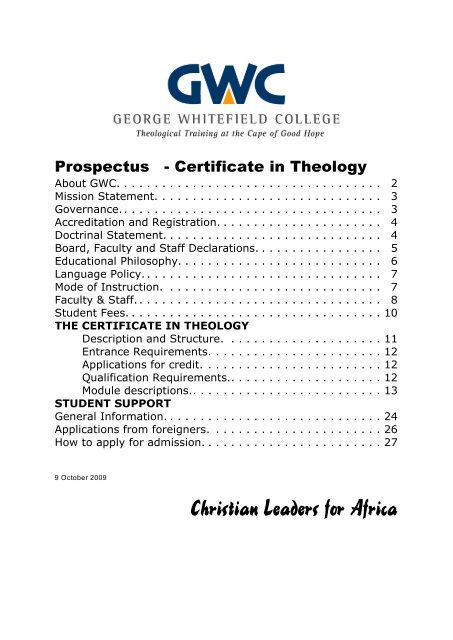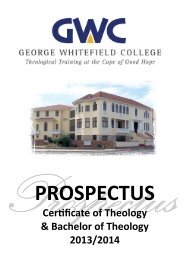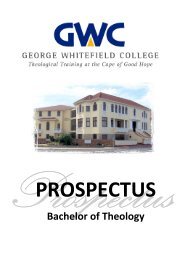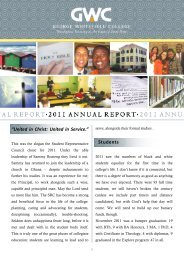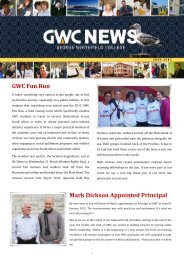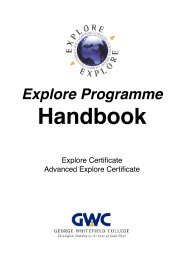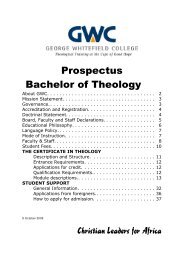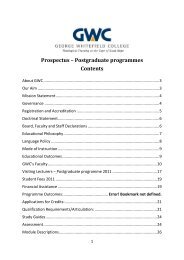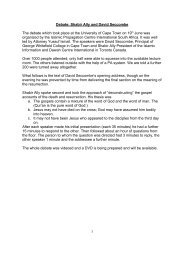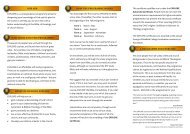Prospectus - Certificate in Theology - George Whitefield College
Prospectus - Certificate in Theology - George Whitefield College
Prospectus - Certificate in Theology - George Whitefield College
You also want an ePaper? Increase the reach of your titles
YUMPU automatically turns print PDFs into web optimized ePapers that Google loves.
<strong>Prospectus</strong><br />
- <strong>Certificate</strong> <strong>in</strong> <strong>Theology</strong><br />
About GWC................................... 2<br />
Mission Statement.............................. 3<br />
Governance................................... 3<br />
Accreditation and Registration. . . . . . . . . . . . . . . . . . . . . . 4<br />
Doctr<strong>in</strong>al Statement............................. 4<br />
Board, Faculty and Staff Declarations. . . . . . . . . . . . . . . . . 5<br />
Educational Philosophy........................... 6<br />
Language Policy................................ 7<br />
Mode of Instruction. ............................ 7<br />
Faculty & Staff................................. 8<br />
Student Fees..................................10<br />
THE CERTIFICATE IN THEOLOGY<br />
Description and Structure. . . . . . . . . . . . . . . . . . . . . 11<br />
Entrance Requirements.......................12<br />
Applications for credit........................12<br />
Qualification Requirements.. . . . . . . . . . . . . . . . . . . . 12<br />
Module descriptions..........................13<br />
STUDENT SUPPORT<br />
General Information.............................24<br />
Applications from foreigners. . . . . . . . . . . . . . . . . . . . . . . 26<br />
How to apply for admission. . . . . . . . . . . . . . . . . . . . . . . . 27<br />
9 October 2009<br />
Christian Leaders for Africa
About GWC<br />
GWC’s beg<strong>in</strong>n<strong>in</strong>gs stem from 1977 with the establishment of <strong>George</strong><br />
<strong>Whitefield</strong> House as a resource and support centre for students of the Church<br />
of England <strong>in</strong> South Africa (CESA) who were then tra<strong>in</strong><strong>in</strong>g for m<strong>in</strong>istry at the<br />
Bible Institute of South Africa <strong>in</strong> Kalk Bay, Cape Town. The Rev David Streater<br />
(later Secretary of the Church Society <strong>in</strong> London) was appo<strong>in</strong>ted as the first<br />
Warden and he was succeeded by the Rev Dr John Newby (later Vice-<br />
Pr<strong>in</strong>cipal of GWC). In 1988 the Rev Dr David Broughton Knox came from<br />
Australia at the request of the CESA Synod to establish <strong>George</strong> <strong>Whitefield</strong><br />
<strong>College</strong>. GWC was located close to the Bible Institute <strong>in</strong> Kalk Bay and the two<br />
colleges worked <strong>in</strong> association from 1989 until 1998 when GWC outgrew its<br />
premises and moved to Muizenberg.<br />
Dr Broughton Knox brought vast experience and knowledge from a long<br />
association with Australia’s Moore Theological <strong>College</strong>, <strong>in</strong>clud<strong>in</strong>g 27 years as<br />
its Pr<strong>in</strong>cipal. Consistent with the theological stance of the CESA, he laid the<br />
foundations for an evangelical and reformed tra<strong>in</strong><strong>in</strong>g of candidates for the<br />
Christian m<strong>in</strong>istry, as well as Scripturally-based <strong>in</strong>struction <strong>in</strong> Christian life and<br />
m<strong>in</strong>istry for the wider community.<br />
In 1993 Dr Knox was succeeded by the Rev Dr David Seccombe and under<br />
his leadership GWC has seen rapid expansion. The <strong>College</strong> is now firmly<br />
established as a high quality <strong>in</strong>stitution with a grow<strong>in</strong>g reputation <strong>in</strong> Africa and<br />
the rest of the world. New programmes, such as the unique Children’s Worker<br />
track, have been added and the exist<strong>in</strong>g curricula improved. Student numbers<br />
have <strong>in</strong>creased and the <strong>College</strong> now attracts students from all over the world<br />
and especially other countries <strong>in</strong> Africa.<br />
Our Aim<br />
G<br />
WC stands under the authority of Holy Scripture as<br />
God’s <strong>in</strong>fallible revelation of himself to human be<strong>in</strong>gs,<br />
culm<strong>in</strong>at<strong>in</strong>g <strong>in</strong> his becom<strong>in</strong>g a man <strong>in</strong> Jesus Christ. Our<br />
programme therefore aims to deepen the students’<br />
understand<strong>in</strong>g of the total message of the Bible, to<br />
develop their capacity to relate to the many complex<br />
situations of modern life, and to tra<strong>in</strong> them to m<strong>in</strong>ister the<br />
biblical message effectively to the needy world.<br />
2
Mission Statement<br />
<strong>George</strong> <strong>Whitefield</strong> <strong>College</strong> (GWC) exists to play its’ part <strong>in</strong> fulfill<strong>in</strong>g the terms<br />
1<br />
of Christ's Great Commission by educat<strong>in</strong>g people <strong>in</strong> the pr<strong>in</strong>ciples of<br />
2<br />
Christian knowledge , and provid<strong>in</strong>g high quality education and tra<strong>in</strong><strong>in</strong>g for<br />
Christian life and m<strong>in</strong>istry, particularly m<strong>in</strong>istries of the Word of God.<br />
1<br />
To disciple the nations and teach them everyth<strong>in</strong>g that Christ enjo<strong>in</strong>ed upon his apostles.<br />
(Matthew 28:19)<br />
2<br />
The knowledge of God and related fields of knowledge.<br />
Governance<br />
<strong>George</strong> <strong>Whitefield</strong> <strong>College</strong> is an association <strong>in</strong>corporated under section 21 of<br />
the Companies Act, 1973 (Registration number: 2003/003197/08). Ultimate<br />
control of the <strong>College</strong> is vested <strong>in</strong> the GWC Board of Directors.<br />
The Board consists of:<br />
The Presid<strong>in</strong>g Bishop of the CESA,<br />
The Pr<strong>in</strong>cipal of the <strong>College</strong>,<br />
Two Rectors of CESA churches, elected by the CESA Synod<br />
Five lay members, be<strong>in</strong>g CESA members.<br />
The present Board Members are:<br />
Bishop Frank Retief Chairman, Presid<strong>in</strong>g Bishop of the CESA<br />
The Rev Prof. David Seccombe Pr<strong>in</strong>cipal of GWC<br />
Mr Ashley Croeser Bus<strong>in</strong>essman<br />
The Rev Dr Mervyn Eloff Rector, St James Church, Kenilworth<br />
Dr Jerry Gule, Bus<strong>in</strong>essman<br />
Mr Thulani Ngubane Schools Inspector, Department of Education<br />
The Rev Dr Mark Norman Rector, CESA Queenswood, Pretoria<br />
Prof Rob Sieborger, Associate Professor, School of Education, UCT.<br />
Mrs Hayley Tubman, Homemaker.<br />
Responsibility for academic matters is vested <strong>in</strong> the Faculty Board which<br />
consists of all full-time faculty members - see page 8.<br />
Responsibility for all other day-to-day college matters (f<strong>in</strong>ance, property,<br />
resources, etc) is vested <strong>in</strong> the Executive Committee, consist<strong>in</strong>g of:<br />
Dr David Seccombe Pr<strong>in</strong>cipal and Chief Executive<br />
(correspondence should be directed through the Pr<strong>in</strong>cipal’s PA, Ms Miza Gobozi: m.gobozi@gwc.ac.za)<br />
The Rev Mark Dickson Vice-pr<strong>in</strong>cipal (mdickson@gwc.ac.za)<br />
Mr Alan Beckman Academic Registrar (abeckman@gwc.ac.za)<br />
Mr Arnie Muller Bus<strong>in</strong>ess Manager (amuller@gwc.ac.za)<br />
Mr Roderick Hoek Development Manager (r.hoek@gwc.ac.za)<br />
3
Accreditation and Registration<br />
<strong>George</strong> <strong>Whitefield</strong> <strong>College</strong> is provisionally accredited by the Council on Higher<br />
Education to offer the <strong>Certificate</strong> <strong>in</strong> <strong>Theology</strong> (reference:<br />
H/PRO052/E001CAN). The college is provisionally registered with the<br />
Department of Education until 31 December 2009 as a private higher<br />
education <strong>in</strong>stitution under the Higher Education Act, 1997 (provisional<br />
registration no 2007/HE08/002). In terms of of the Act and its regulations<br />
(section 54(6)(b) and regulations 17(2)(c) & 17(3)), provisional registration will<br />
lapse if the <strong>College</strong> fails to satisfy the requirements for registration by 31<br />
December 2009. GWC has fulfilled all the requirements and is await<strong>in</strong>g the<br />
conversion of its registration as at the date of production of this prospectus.<br />
The team at GWC constantly strives to offer high quality and carefully<br />
structured programmes. We have confidence <strong>in</strong> our programmes and our<br />
ability to meet statutory requirements. Prospective students should note that,<br />
<strong>in</strong> terms of the regulations, guarantees are <strong>in</strong> place to ensure that they receive<br />
the education tra<strong>in</strong><strong>in</strong>g for which they enrol and pay.<br />
Doctr<strong>in</strong>al Statement<br />
We believe that God has revealed himself and his plan for the human race<br />
through the prophetic writ<strong>in</strong>gs of the Old and New Testaments, and ultimately<br />
by becom<strong>in</strong>g a man <strong>in</strong> the person of Jesus Christ. At the heart of this plan is<br />
God’s establishment of Jesus Christ as Lord and K<strong>in</strong>g of his Universe through<br />
his s<strong>in</strong>-bear<strong>in</strong>g death and death-defeat<strong>in</strong>g resurrection. Jesus commanded<br />
that this be communicated to people of all nations that they might believe and<br />
be saved, before his com<strong>in</strong>g aga<strong>in</strong> to rule visibly, gloriously and for ever.<br />
Salvation is by Christ’s grace alone, and is received by faith alone. Believers<br />
become members of Christ (“<strong>in</strong> Christ”) and this determ<strong>in</strong>es their fundamental<br />
corporate identity, transcend<strong>in</strong>g all differences of nationality, race, gender and<br />
class. As Christians, we are one body <strong>in</strong> Christ and <strong>in</strong>dividually children of God<br />
and brothers and sisters to each other.<br />
4
Board, Faculty and Staff Declarations<br />
Board members and Faculty of GWC make the follow<strong>in</strong>g declaration prior to<br />
tak<strong>in</strong>g office:<br />
I believe and hold the Christian faith and <strong>in</strong> particular, as set forth <strong>in</strong> the<br />
creeds known as the Nicene Creed and the Apostles’ Creed and the<br />
doctr<strong>in</strong>e conta<strong>in</strong>ed <strong>in</strong> the Thirty-n<strong>in</strong>e Articles of Religion* <strong>in</strong>terpreted<br />
accord<strong>in</strong>g to their pla<strong>in</strong> and literal sense.<br />
In particular, I believe:<br />
that the canonical Scriptures of the Old and New Testaments are the<br />
ultimate rule and standard of faith given by <strong>in</strong>spiration of God and<br />
conta<strong>in</strong><strong>in</strong>g all th<strong>in</strong>gs necessary to salvation;<br />
and<br />
that man is justified before God only because of the merit of our Lord<br />
and Saviour Jesus Christ by faith and not because of his own works or<br />
merit.<br />
*The Thirty-N<strong>in</strong>e Articles of Religion are the statement of faith subscribed to by m<strong>in</strong>isters of the Church of<br />
England <strong>in</strong> South Africa and other Anglican denom<strong>in</strong>ations throughout the world. They may be found at the<br />
back of most Anglican Prayer Books.<br />
Recognis<strong>in</strong>g the sensitivities of its South African context, Faculty and staff at<br />
GWC sign the follow<strong>in</strong>g declaration:<br />
As teachers and staff at <strong>George</strong> <strong>Whitefield</strong> <strong>College</strong> we believe that Christ<br />
welcomes to his k<strong>in</strong>gdom men, women and children of all races and<br />
nationalities as equals <strong>in</strong> Christ. We therefore commit ourselves to:<br />
1. pray<strong>in</strong>g for one another: students, faculty and staff<br />
2. work<strong>in</strong>g for the upliftment and progress of the students of the <strong>College</strong>,<br />
whatever their race or gender<br />
3. be<strong>in</strong>g fair and even-handed <strong>in</strong> all our deal<strong>in</strong>gs with the students<br />
4. be<strong>in</strong>g respectful and courteous to everyone <strong>in</strong> the <strong>College</strong>, regardless of<br />
race, gender or position<br />
5
Educational Philosophy<br />
Foundational to GWC’s educational method is the conviction that the Bible is<br />
God’s Word and that teach<strong>in</strong>g God’s Word is the core of Christian m<strong>in</strong>istry.<br />
Much attention is given, therefore, to the study of the Bible, which is a<br />
foundational text book and primary source. This entails attention to the orig<strong>in</strong>al<br />
languages <strong>in</strong> which the Bible was written, and its historical, cultural, and<br />
literary background. It also entails study of the systematic formalization of the<br />
doctr<strong>in</strong>es and ethical teach<strong>in</strong>gs of the Bible.<br />
GWC is also appreciatively aware of the rich Christian heritage of thought,<br />
worship, life and m<strong>in</strong>istry to which it is heir, and is active <strong>in</strong> understand<strong>in</strong>g,<br />
critically assess<strong>in</strong>g and preserv<strong>in</strong>g this tradition. This entails critical study of<br />
the history of (Judaeo) Christian belief and practice, <strong>in</strong>clud<strong>in</strong>g the<br />
controversies, past and present, which need to be understood and evaluated.<br />
M<strong>in</strong>istry skills are best learned by do<strong>in</strong>g. GWC provides certa<strong>in</strong> workshops of a<br />
practical nature <strong>in</strong> its regular curriculum, but also requires that students<br />
undertake supervised field work.<br />
In addition to a rigorous application to master<strong>in</strong>g the knowledge,<br />
understand<strong>in</strong>g and skills base of the Christian Faith, we seek as broad and<br />
deep an understand<strong>in</strong>g of the philosophies, religions and cultures of the world<br />
we live <strong>in</strong> as is possible with<strong>in</strong> the time constra<strong>in</strong>ts of the courses.<br />
God has revealed himself <strong>in</strong> order that we might know him, enjoy him and<br />
serve him, so our teach<strong>in</strong>g and learn<strong>in</strong>g takes place <strong>in</strong> a context of faith and<br />
commitment - “faith seek<strong>in</strong>g understand<strong>in</strong>g of itself” (Anselm). This aspect of<br />
our educational method expresses itself <strong>in</strong><br />
• a culture of consciously and deliberately learn<strong>in</strong>g from Christ.<br />
• the evangelical commitment of teachers.<br />
• the Christian commitment of the students.<br />
• a mutual concern for spiritual growth amongst students, teachers and<br />
staff.<br />
• worship, prayer and fellowship with<strong>in</strong> the formal and <strong>in</strong>formal life of the<br />
<strong>College</strong>.<br />
6
Language Policy<br />
The primary teach<strong>in</strong>g and learn<strong>in</strong>g mode at GWC is through contact lectures <strong>in</strong><br />
the English language. It is therefore necessary for prospective students to be<br />
proficient <strong>in</strong> English - read<strong>in</strong>g, writ<strong>in</strong>g and comprehension. The college<br />
reserves the right to require a language exam<strong>in</strong>ation of its choice as a<br />
prerequisite to admission. Every assistance is given to students whose first<br />
language is not English with tutorial classes arranged where warranted. In<br />
some cases however, students are advised to enrol for a recognised English<br />
language course as offered by various <strong>in</strong>stitutions.<br />
Mode of Instruction<br />
The ma<strong>in</strong> mode of <strong>in</strong>struction is through contact lectures held between 08:00<br />
to 15:30 Mondays to Fridays - please see the calendar for details of the<br />
college academic year and terms. Timetables are published <strong>in</strong> advance of<br />
each term giv<strong>in</strong>g details of classes and venues. Wherever possible, afternoon<br />
lectures are avoided. Christian m<strong>in</strong>istry is best learnt not from books and<br />
lectures alone, but through a dynamic <strong>in</strong>teraction with people. The programme<br />
therefore <strong>in</strong>cludes a field work component, regular chapel services and other<br />
opportunities to practise skills learnt. There is also time for unstructured<br />
<strong>in</strong>teraction - a weekly college lunch, coffee times, fellowship groups, etc.<br />
Educational Outcomes<br />
A GWC graduate should<br />
love God and neighbourand express it <strong>in</strong> service and prayer.<br />
know and understand the Bible.<br />
be able to:<br />
• <strong>in</strong>terpret the Bible accurately and responsibly.<br />
• expla<strong>in</strong> and defend the truths and practices of the Christian Faith.<br />
• carry out practical Christian m<strong>in</strong>istry, especially the teach<strong>in</strong>g and<br />
preach<strong>in</strong>g of God’s Word.<br />
7
Full-time Faculty<br />
David Seccombe (Christian Doctr<strong>in</strong>e; New Testament)<br />
BSc Hons (University of New England), LTh Hons (Moore <strong>College</strong> & Australian <strong>College</strong> of <strong>Theology</strong>),<br />
BD Hons (London University), Diploma of Religious Education (Melbourne <strong>College</strong> of Div<strong>in</strong>ity), PhD<br />
(Cambridge University).<br />
David is Pr<strong>in</strong>cipal of GWC. His PhD dissertation is published as Possessions and the Poor <strong>in</strong> Luke-<br />
Acts (L<strong>in</strong>z: SNTU, 1982). Other books <strong>in</strong>clude Dust to Dest<strong>in</strong>y: Read<strong>in</strong>g Romans Today (Sydney:<br />
Aquila, 1996), The K<strong>in</strong>g of God's K<strong>in</strong>gdom: A Solution to the Puzzle of Jesus (Carlisle: Paternoster,<br />
2002). Formerly Rector of St Matthew's Anglican Church <strong>in</strong> Shenton Park, Western Australia (1979 -<br />
1992), he was appo<strong>in</strong>ted Pr<strong>in</strong>cipal of GWC <strong>in</strong> 1993. He is an Affiliate Professor of New Testament at<br />
North-West University. David is married to Lorra<strong>in</strong>e and they have a son and three daughters.<br />
Mark Dickson (Biblical Hebrew; Philosophy; Pastoral Studies)<br />
BSc (Major: Physics) (UCT), Dip Th (BISA), MA (NWU)<br />
Mark is Vice-Pr<strong>in</strong>cipal and holds the C.S. Lewis Lectureship <strong>in</strong> Christian Thought. He is<br />
especially <strong>in</strong>terested <strong>in</strong> grappl<strong>in</strong>g with foundational truths of the Christian Faith, apply<strong>in</strong>g and<br />
packag<strong>in</strong>g them to address the issues of modern society, and has special expertise <strong>in</strong> the<br />
area of science and Christianity. Mark was the senior m<strong>in</strong>ister of St Matthews Church <strong>in</strong><br />
Table View (Cape Town) for 17years, and is still actively <strong>in</strong>volved <strong>in</strong> m<strong>in</strong>istry there. He is<br />
married to Julie and they have two sons and a daughter.<br />
Benjam<strong>in</strong> Dean (Systematic <strong>Theology</strong>)<br />
BA Hons (London School of <strong>Theology</strong>), MA (K<strong>in</strong>g's <strong>College</strong>, London), MPhil, PhD, CTh (University of<br />
Cambridge).<br />
Ben is GWC's Dean of Postgraduate Studies. His doctoral thesis is entitled 'Torrance's Vision of the<br />
Tr<strong>in</strong>ity'. He is married to Naomi and they have a daughter and three sons.<br />
Siegfried Ngubane (Pastoral Studies; World Religions; Evangelism)<br />
LTh (GWC), BA Hons Theol (U. Western Cape).<br />
Siegfried is Lecturer <strong>in</strong> African Church Plant<strong>in</strong>g and Leadership M<strong>in</strong>istries. This position <strong>in</strong>volves<br />
lectur<strong>in</strong>g, tutor<strong>in</strong>g, pastoral care of students and actual supervision of graduates <strong>in</strong> township church<br />
plant<strong>in</strong>g m<strong>in</strong>istries. After graduat<strong>in</strong>g from GWC <strong>in</strong> 1997, he was <strong>in</strong>vited to plant a church among Xhosa<br />
speak<strong>in</strong>g people <strong>in</strong> Khayelitsha, one of the fast grow<strong>in</strong>g townships <strong>in</strong> South Africa. He is currently<br />
complet<strong>in</strong>g a Masters Degree <strong>in</strong> Missions. He still serves as a Senior Pastor of Mandela Park<br />
Community Church and his duties <strong>in</strong>volve supervis<strong>in</strong>g curates and GW C students placed <strong>in</strong><br />
Khayelitsha. Siegfried has taken <strong>in</strong>terest <strong>in</strong> African Traditional Religions Studies, especially the aspect<br />
of Ancestral Worship. M<strong>in</strong>ister<strong>in</strong>g at Khayelitsha where there is a high prevalence of HIV/AIDS has<br />
forced him not to ignore the pandemic that is affect<strong>in</strong>g millions <strong>in</strong> South Africa. He contributed a<br />
chapter to a recent book on majority world m<strong>in</strong>istry (“The Context of M<strong>in</strong>istry <strong>in</strong> South Africa:<br />
HIV/AIDS”, <strong>in</strong> A Different Perspective. Sydney: OCA Books, 2006) He is married to Maureen and they<br />
have three children: two teenage girls and a boy.<br />
John Child (Christian Doctr<strong>in</strong>e; Ethics; Pastoral Studies)<br />
BA (Rhodes), Dip Th (BISA), BD Hons (London), MTh (UNISA).<br />
John is the Peter Chamane Lecturer <strong>in</strong> Systematic <strong>Theology</strong> and Ethics. He wrote the articles on<br />
Apartheid and the Christian Reconstruction Movement <strong>in</strong> the New Dictionary of Christian Ethics and<br />
Pastoral <strong>Theology</strong>, and wrote a thesis on Biblical Law <strong>in</strong> the <strong>Theology</strong> of R. J. Rushdoony. He is<br />
currently do<strong>in</strong>g research <strong>in</strong>to modern day prophecy for a PhD. John spent thirteen years <strong>in</strong> the<br />
bus<strong>in</strong>ess world prior to his ord<strong>in</strong>ation <strong>in</strong> 1989. He was Rector of Christ Church, La Lucia, before jo<strong>in</strong><strong>in</strong>g<br />
the Faculty <strong>in</strong> 1997. He is currently also m<strong>in</strong>ister <strong>in</strong> charge of Muizenberg Community Church, a<br />
church plant on the <strong>College</strong> campus. John is married to Marion and they have four children.<br />
8
Ross Anderson (Biblical Studies)<br />
B.Th (Unisa); Dip.Th (Bisa); M.Th (UWC)<br />
Ross was born <strong>in</strong> Swaziland and grew up <strong>in</strong> Zululand. He was converted <strong>in</strong> 1975 and started<br />
preach<strong>in</strong>g <strong>in</strong> 1977 under the guidance of Ken Terhoven. He qualified as a diesel mechanic with<br />
International Harvester to fund his theological studies. He was orda<strong>in</strong>ed <strong>in</strong> the Church of England <strong>in</strong><br />
South Africa <strong>in</strong> 1982. Ross did his first curacy at Holy Tr<strong>in</strong>ity Pietermaritzburg, and his second at Christ<br />
Church Paarl. He then served as rector of Christ Church Somerset West until 1987 when he moved to<br />
St.James Church <strong>in</strong> Kenilworth, Cape Town. He jo<strong>in</strong>s the GWC faculty <strong>in</strong> October 2009. He has led<br />
numerous mission trips <strong>in</strong>to the mounta<strong>in</strong>s of Lesotho. He is married to L<strong>in</strong>dy and they have three<br />
children: Sarah-Jane, Bruce and Poppy.<br />
Victor Owuor (Biblical Studies)<br />
Dip.Th (Moffatt <strong>College</strong> of the Bible), LTh (Evangelical Sem<strong>in</strong>ary of South Africa), BA Hons<br />
(Potchefstroom), MA (North West University).<br />
Victor is tutor and junior lecturer as he works on a PhD research project. He m<strong>in</strong>istered as a pastor <strong>in</strong><br />
a congregation of over 700 regular attendants <strong>in</strong> Kisumu, Kenya for four years. While serv<strong>in</strong>g <strong>in</strong> the<br />
same church he also lectured part time at Ahero Evangelical School of <strong>Theology</strong>. Victor jo<strong>in</strong>ed GWC<br />
<strong>in</strong> 2006. He has published The Gospel <strong>in</strong> Africa: A Survey of African <strong>Theology</strong> from the 1960s to 2000.<br />
His MA dissertation is entitled Resurrection Hope <strong>in</strong> the African Context: Challeng<strong>in</strong>g Luo beliefs and<br />
practices concern<strong>in</strong>g death. He is married to Mary and they have a son and a daughter.<br />
Jonathan More (NT Greek; NT Exegesis; Early Church History)<br />
B Eng (Electronic), M Eng (Electronic)(US), LTh (GWC), BA (<strong>Theology</strong>), Hons BA (PUCHE), ThM<br />
(Pr<strong>in</strong>ceton Theological Sem<strong>in</strong>ary, USA).<br />
Jonathan is the first GWC graduate to be appo<strong>in</strong>ted to Faculty, hav<strong>in</strong>g jo<strong>in</strong>ed <strong>in</strong> 2001. He has been<br />
<strong>in</strong>volved with student m<strong>in</strong>istry at St. Paul's (Stellenbosch) and the Free University <strong>in</strong> Amsterdam, and<br />
is currently a member of Holy Tr<strong>in</strong>ity (Gardens, Cape Town). Jonathan's most recent publications<br />
<strong>in</strong>clude "Prayer and the K<strong>in</strong>gdom <strong>in</strong> the Gospel of Luke," (SABJT), "Tak<strong>in</strong>g the Quandary out of<br />
Christian Ethics" (with Deane-Peter Baker) (JTSA) and "K<strong>in</strong>gship Ideology: A Neglected Element <strong>in</strong><br />
Aristeas' Charter Myth for Alexandrian Judaism" <strong>in</strong> Septuag<strong>in</strong>t and Reception (ed. Johann Cook).<br />
Jonathan's current research is focussed on k<strong>in</strong>gship ideology <strong>in</strong> Graeco-Roman philosophy and<br />
Paul<strong>in</strong>e Christology.<br />
Alan Beckman (Anglican History, Faith & Practice)<br />
LTh (BISA).<br />
Alan, a former bank manager with over 20 years service, graduated from the Bible Institute and<br />
<strong>George</strong> <strong>Whitefield</strong> <strong>College</strong> <strong>in</strong> 1990 and was then appo<strong>in</strong>ted as Adm<strong>in</strong>istrator of GW C, cover<strong>in</strong>g both<br />
academic and bus<strong>in</strong>ess adm<strong>in</strong>istration. Follow<strong>in</strong>g the rapid growth of the college, he is now Academic<br />
Registrar. He also lectures <strong>in</strong> Anglicanism (history, doctr<strong>in</strong>e, liturgy and the gospel sacraments). Alan<br />
is married to Marilyn and they have three adult children. He is currently engaged <strong>in</strong> Masters studies <strong>in</strong><br />
Anglicanism.<br />
Alan Profitt (Pastoral M<strong>in</strong>istry; Missions; Islamics)<br />
Dip Th (BISA), B Th (Unisa), HDE (UCT), MA (Practical Theol. Pretoria Univ)<br />
Alan serves with SIM and teaches courses at a number of evangelical theological colleges. He is<br />
engaged with <strong>in</strong>vestigat<strong>in</strong>g topics for dialogue with Muslims, read<strong>in</strong>g on HIV/AIDS, and read<strong>in</strong>g and<br />
dialogue with African Traditional Religions. Alan’s wife, Jeni, teaches Grade R at Eagles W<strong>in</strong>gs School<br />
<strong>in</strong> Khayelitsha. They have three Children who follow and serve the Lord. Alan enjoys sport and<br />
meet<strong>in</strong>g people.<br />
Associate Faculty:<br />
Mervyn Eloff (Biblical <strong>Theology</strong>; Old Testament)<br />
BSc (U. Orange Free State), LTh (Bible Institute of SA), MTh, DTh (Stellenbosch).<br />
Mervyn was Vice-Pr<strong>in</strong>cipal for a number of years and held the J C Ryle Lectureship <strong>in</strong> Biblical<br />
<strong>Theology</strong> and Exegesis. He is now Rector of St James Church, Kenilworth and a highly valued<br />
associate faculty member of the college. W hilst study<strong>in</strong>g at the Bible Institute, he planted a church <strong>in</strong><br />
9
Table View, Cape Town and then did a 3 year curacy at St Helen's Church, London under the<br />
rectorship of Dick Lucas. On his return from the UK, Mervyn served as Rector of St Paul's Church<br />
Stellenbosch, a church with a thriv<strong>in</strong>g student m<strong>in</strong>istry. Mervyn jo<strong>in</strong>ed the faculty of GW C <strong>in</strong> 1994. His<br />
doctoral dissertation is on Matthew's Gospel and is entitled Restoration from Exile and the<br />
Interpretation of Matthew's Gospel. Mervyn has rema<strong>in</strong>ed actively <strong>in</strong>volved <strong>in</strong> preach<strong>in</strong>g and church<br />
plant<strong>in</strong>g. He is the chairman of the Bible Teacher's Network, an organization designed to encourage<br />
Bible teachers <strong>in</strong> the task of expository preach<strong>in</strong>g. He is married to Alison and they have two<br />
daughters.<br />
Vhumani Magezi (Pastoral M<strong>in</strong>istry and Post Graduate Supervision)<br />
DipEd (U. Zimbabwe), Dip. Tra<strong>in</strong><strong>in</strong>g Management (Inst. Personel Management Zimbabwe), BA (North<br />
West University), LTh (Bible Institute of SA), MTh, MPhil, D Th (U. Stellenbosch)<br />
Dr Magezi’s doctoral research topic was: Life beyond <strong>in</strong>fection: Home-based care to people with HIVpositive<br />
status with<strong>in</strong> a context of poverty. He worked <strong>in</strong> bus<strong>in</strong>ess and taught high school science while<br />
at the same time be<strong>in</strong>g <strong>in</strong>volved <strong>in</strong> Scripture Union and Baptist Youth Leadership before jo<strong>in</strong><strong>in</strong>g the<br />
m<strong>in</strong>istry. He has published Congregational Home-Based Pastoral Care: Merg<strong>in</strong>g the African Family<br />
and Church Family Systems for Effective HIV M<strong>in</strong>istry (JTSA July 2006) and Between heal<strong>in</strong>g and<br />
fann<strong>in</strong>g pa<strong>in</strong>: The dynamics of community heal<strong>in</strong>g and <strong>in</strong>tegrative pastoral care to the sick and<br />
suffer<strong>in</strong>g <strong>in</strong> Africa (In die Skriflig 40(3), 2006). He is also research<strong>in</strong>g and has presented sem<strong>in</strong>ar and<br />
conference papers on several theological and developmental topics which <strong>in</strong>clude: Systemicecclesiological<br />
responses to poverty and HIV/AIDS; HIV/AIDS pastoral therapy; Pastoral counsell<strong>in</strong>g<br />
diagnosis <strong>in</strong> Africa; Community participation & community development; Impact of globalization on<br />
Southern Africa economies; Culture and development; Social capital & development; Development<br />
theories; Monitor<strong>in</strong>g and evaluation designs; and Evaluation theory. Vhumani’s concern is to see the<br />
Evangelical doctr<strong>in</strong>e be<strong>in</strong>g responsibly merged with practice <strong>in</strong> Africa, be<strong>in</strong>g faithful <strong>in</strong> shar<strong>in</strong>g the<br />
gospel truth while at the same time demonstrat<strong>in</strong>g the gospel truth. His vision is to tra<strong>in</strong> Christian<br />
leaders <strong>in</strong> Africa who are both competent <strong>in</strong> <strong>in</strong>terpret<strong>in</strong>g and apply<strong>in</strong>g the Bible to address the needs of<br />
the people <strong>in</strong> order to advance the K<strong>in</strong>gdom of God.<br />
Paul Bowers (Paul<strong>in</strong>e Studies)<br />
BA (Columbia International University), MA (Wheaton <strong>College</strong> Graduate School), MDiv (Tr<strong>in</strong>ity<br />
International University), PhD (University of Cambridge).<br />
Paul’s doctoral dissertation was Studies <strong>in</strong> Paul's Understand<strong>in</strong>g of His Mission. He is currently based<br />
<strong>in</strong> the USA but visits with GWC each year teach<strong>in</strong>g Paul<strong>in</strong>e studies and lead<strong>in</strong>g sem<strong>in</strong>ars. Paul has<br />
served with SIM International <strong>in</strong> theological education <strong>in</strong> Africa s<strong>in</strong>ce 1968 <strong>in</strong> Nigeria, Kenya and<br />
Zimbabwe. He has worked adm<strong>in</strong>istratively for the Accredit<strong>in</strong>g Council for Theological Education <strong>in</strong><br />
Africa (ACTEA) s<strong>in</strong>ce its found<strong>in</strong>g <strong>in</strong> 1976, and for the International Council for Evangelical Theological<br />
Education (ICETE) s<strong>in</strong>ce its found<strong>in</strong>g <strong>in</strong> 1980. He is currently ICETE's International Adm<strong>in</strong>istrator. He<br />
has been on the editorial staff of the Africa Journal of Evangelical <strong>Theology</strong> (Kenya) s<strong>in</strong>ce 1982, and is<br />
manag<strong>in</strong>g editor of Book Notes for Africa. He has published a number of books and articles. Paul is<br />
married to Evie and they have two adult daughters.<br />
John Newby (Church History; Post Graduate Supervision)<br />
BTh, BTh Hons, MTh (Church History) (UNISA), DPhil (PUCHE).<br />
John was formerly Vice-Pr<strong>in</strong>cipal of GW C and, s<strong>in</strong>ce his retirement, cont<strong>in</strong>ues to teach on a part-time<br />
basis. The title of his doctoral thesis is The <strong>Theology</strong> of John Charles Ryle. S<strong>in</strong>ce 1974 he has been<br />
an orda<strong>in</strong>ed m<strong>in</strong>ister of the Church of England of South Africa, dur<strong>in</strong>g which time he was delegate to<br />
the Reformed Ecumenical Synod (1976-1984); a member of the Theological Commission of CESA,<br />
and convener of the Synod Commission on the M<strong>in</strong>istry of Women <strong>in</strong> the Church. He lectures<br />
pr<strong>in</strong>cipally <strong>in</strong> Church History. He has acted as External Exam<strong>in</strong>er of Masters' Dissertations for the<br />
University of South Africa, and is a member of the Church History Society of SA.<br />
Student Fees<br />
Please see the attached student fees brochure.<br />
10
The <strong>Certificate</strong> <strong>in</strong> <strong>Theology</strong><br />
Programme Description and Aim:<br />
The aim of this one year full-time programme is:<br />
• to provide a basic theological and pastoral tra<strong>in</strong><strong>in</strong>g for first-level church<br />
workers for service <strong>in</strong> various church m<strong>in</strong>istries.<br />
• to provide a Biblical ground<strong>in</strong>g for further higher education studies,<br />
whether <strong>in</strong> theology or other fields of knowledge.<br />
• to tra<strong>in</strong> the learner <strong>in</strong> the discipl<strong>in</strong>es and skills required for higher<br />
education studies, <strong>in</strong>clud<strong>in</strong>g the use of technology.<br />
• to impart elementary skills for pastor<strong>in</strong>g members of the community.<br />
Programme Structure<br />
The programme comprises fundamental, core and elective modules as shown<br />
below. All modules are at NQF level 5. The certificate requires a m<strong>in</strong>imum of<br />
128 credits (A credit is nom<strong>in</strong>ally equivalent to 10 hours of work, <strong>in</strong>clud<strong>in</strong>g<br />
contact lectures, study, etc). Fundamental and core modules are compulsory.<br />
The credit rat<strong>in</strong>g is shown <strong>in</strong> brackets below.<br />
Fundamental Modules<br />
• Learn<strong>in</strong>g development (8 credits)<br />
• Computer & <strong>in</strong>formation skills (8)<br />
• Communication skills (8)<br />
Core Modules<br />
• Christian thought (32)<br />
• Mission and culture (16)<br />
• Biblical studies (40)<br />
Programme Electives:<br />
Applicants must choose at least one of the follow<strong>in</strong>g electives:<br />
• Pastoral m<strong>in</strong>istry (16)<br />
• Children’s m<strong>in</strong>istry (16)<br />
• Women’s m<strong>in</strong>istry (16)<br />
• Youth m<strong>in</strong>istry (16)<br />
• Mission (16)<br />
Please note that electives will only be offered if there are sufficient<br />
applicants <strong>in</strong> the op<strong>in</strong>ion of the Faculty Board.<br />
11
Additional Modules<br />
In addition, one or two language modules may be chosen, if desired. Note:<br />
Either Greek or Hebrew may be selected, not both.<br />
• New Testament Greek 1A (12)<br />
• New Testament 1B (12)<br />
• Biblical Hebrew 1A (12)<br />
• Biblical Hebrew 1B (12)<br />
Programme Outcomes:<br />
Graduates of the <strong>Certificate</strong> <strong>in</strong> M<strong>in</strong>istry should be able to expla<strong>in</strong> the basic<br />
teach<strong>in</strong>gs of Christianity and the overall mean<strong>in</strong>g of the Bible, and give talks<br />
based on Old and New Testament passages and on simple biblical themes.<br />
They should have an understand<strong>in</strong>g of how churches are meant to function,<br />
and elementary skills <strong>in</strong> teach<strong>in</strong>g, counsell<strong>in</strong>g and small group leadership.<br />
Entrance Requirements:<br />
National Senior <strong>Certificate</strong> or equivalent with a m<strong>in</strong>imum of 30% <strong>in</strong> English<br />
language. (Per Government Gazette No. 751, 11 July 2008). Admission<br />
through Recognition of Prior Learn<strong>in</strong>g (RPL) is permitted for a maximum of<br />
10% of the enrolment for any year. See the General Regulations for details of<br />
RPL procedures. Learners <strong>in</strong> this category may be permitted to complete the<br />
qualification over a maximum of two years with the Faculty Board’s agreement.<br />
Applications for Credit:<br />
Applications for advanced credit for <strong>in</strong>dividual modules must be applied for <strong>in</strong><br />
writ<strong>in</strong>g - see RPL procedures <strong>in</strong> the General Regulations. Credits may only be<br />
granted for up to 30% of the total programme credit value.<br />
Qualification Requirements:<br />
A m<strong>in</strong>imum of 128 credits with passes <strong>in</strong> all fundamental and core subjects.<br />
See the general regulations and <strong>in</strong>dividual study guides for module pass<br />
requirements. The qualification will be annotated to reflect the field of<br />
specialisation determ<strong>in</strong>ed by the electives chosen.<br />
Holders of the <strong>Certificate</strong> <strong>in</strong> <strong>Theology</strong> may apply for entry <strong>in</strong>to the Bachelor of<br />
<strong>Theology</strong> programme.<br />
Study Guides<br />
At the commencement of each module you will receive a study guide which<br />
sets out the, <strong>in</strong>ter alia, the follow<strong>in</strong>g <strong>in</strong>formation:<br />
P<br />
P<br />
the aim of the module and how it contributes to the overall programme<br />
outcomes.<br />
the module outcomes<br />
12
P<br />
P<br />
P<br />
an outl<strong>in</strong>e of the lecture programme<br />
required and recommended read<strong>in</strong>g<br />
the assessment requirements<br />
Assessment<br />
The aim of assessment is to determ<strong>in</strong>e whether the outcomes, as specified <strong>in</strong><br />
the study guides, have been achieved. A variety of assessment methods are<br />
used, both formative (i.e. on-go<strong>in</strong>g) - tests, assignments, class participation;<br />
and summative (exam<strong>in</strong>ations). The exact method of assessment for each<br />
module is specified <strong>in</strong> the module study guide, available at the commencement<br />
of each module.<br />
Module Descriptions<br />
Code Cr Description and Outcomes<br />
FUNDAMENTAL MODULES (24 credits):<br />
SK101 8 Learn<strong>in</strong>g development<br />
This course will enable you to learn and practise study methods that will help you to be<br />
discipl<strong>in</strong>ed and effective <strong>in</strong> learn<strong>in</strong>g. The course will cover note tak<strong>in</strong>g, read<strong>in</strong>g and writ<strong>in</strong>g<br />
skills as well as the Harvard Reference system.<br />
At the end of the course you should be able to:<br />
• design a realistic study timetable for yourself.<br />
• read and take notes from books and journal articles.<br />
• present usable lecture notes from college lectures.<br />
• f<strong>in</strong>d and extract <strong>in</strong>formation from books and other resources <strong>in</strong> the library.<br />
• analyse the contents and themes of books.<br />
• write a clearly developed essay, avoid<strong>in</strong>g logical errors.<br />
• correctly use the Harvard Reference System.<br />
SK103 8 Computer & Information Skills<br />
In this course you will learn the basics of personal computers and a number of applications<br />
You will also learn to use various electronic resources (<strong>in</strong>clud<strong>in</strong>g the <strong>in</strong>ternet) <strong>in</strong> your<br />
research and to compile that research <strong>in</strong> an orderly fashion <strong>in</strong> a word processor.<br />
At the end of this course you should be able to:<br />
• have a basic understand<strong>in</strong>g of computer hardware, software and peripherals.<br />
• utilise various programmes efficiently.<br />
• use electronic media and methodology <strong>in</strong> your research.<br />
13
Code Cr Description and Outcomes<br />
PS101 8 Communication Skills<br />
CORE MODULES (88 credits):<br />
Communication covers the area of public read<strong>in</strong>g of Scripture, prepar<strong>in</strong>g testimonies and<br />
evangelistic talks, and preparation and delivery of expository sermons.<br />
At the end of the course you should be able to:<br />
• read and speak clearly, <strong>in</strong>telligibly and command<strong>in</strong>gly <strong>in</strong> public.<br />
• give a short talk with and without notes<br />
• deliver your own testimony effectively<br />
• prepare and deliver an evangelistic talk<br />
• expla<strong>in</strong> a Bible passage publicly<br />
• prepare simple expository sermons<br />
1 CHRISTIAN THOUGHT (32 credits):<br />
CH110 8 Church History Introduction<br />
DS107 8 Ethics 1<br />
This basic church history course <strong>in</strong>troduces one year students to the subject by describ<strong>in</strong>g<br />
key moments, movements and personalities.<br />
At the end of the course you should be able to:<br />
• trace the general progress of the church through the centuries.<br />
• expla<strong>in</strong> the significance of key figures <strong>in</strong> the church’s history.<br />
This course exam<strong>in</strong>es what the Bible teaches about the moral will of God for human be<strong>in</strong>gs<br />
that we may be better able to live a God-pleas<strong>in</strong>g life and be able to evaluate modern<br />
ethical dilemmas <strong>in</strong> the light of biblical ethics.<br />
At the end of the course you should be able to:<br />
• show a basic knowledge of biblical ethics<br />
• know and understand the mean<strong>in</strong>g of each of the ten commandments <strong>in</strong> their orig<strong>in</strong>al<br />
context and <strong>in</strong> the light of the NT, the basic moral pr<strong>in</strong>ciples <strong>in</strong>form<strong>in</strong>g them, their scope<br />
and how they relate to the modern world.<br />
• articulate how Paul dealt with ethical issues <strong>in</strong> 1 Cor<strong>in</strong>thians knowledgeably and<br />
biblically discuss several contemporary moral issues, one <strong>in</strong> depth.<br />
DS114 16 Introduction to Doctr<strong>in</strong>e (Hard Questions)<br />
Hard Questions is a major course which <strong>in</strong>troduces you to what Christians believe and why<br />
they believe it, <strong>in</strong> order that you may develop your own thoughtful, reasoned overview of the<br />
Christian Faith.<br />
At the end of this course you should be able to<br />
• state <strong>in</strong> you own words answers to commonly asked questions about the nature of<br />
Christian Faith.<br />
• po<strong>in</strong>t to the scriptural passages relevant to the answer<strong>in</strong>g of those questions and<br />
expla<strong>in</strong> the mean<strong>in</strong>g of the passages.<br />
• give other reasons for why you believe these th<strong>in</strong>gs to be true.<br />
2 MISSION AND CULTURE (16 credits)<br />
14
Code Cr Description and Outcomes<br />
MS101 4 Introduction to World Religions<br />
PS209 4 Evangelism<br />
This course looks at the orig<strong>in</strong>s of the world religions and then serves to briefly <strong>in</strong>troduce<br />
you to a number of religions that are important <strong>in</strong> the local context, look<strong>in</strong>g at their orig<strong>in</strong>s,<br />
world-views, and cultural dist<strong>in</strong>ctives.<br />
At the end of the course, you should be able to:<br />
• state and defend a biblical understand<strong>in</strong>g of the orig<strong>in</strong> of religion as opposed to a<br />
liberal understand<strong>in</strong>g thereof.<br />
• describe briefly the orig<strong>in</strong>s and history of the religions covered <strong>in</strong> this course.<br />
• show a basic understand<strong>in</strong>g of the ideas & practices and worldviews of the religions<br />
covered <strong>in</strong> this course.<br />
• beg<strong>in</strong> to critically analyse these religions <strong>in</strong> the light of the claims of Christianity.<br />
• beg<strong>in</strong> to formulate ideas to equip yourself to evangelise people of other faiths.<br />
This course looks at fundamental issues <strong>in</strong> evangelism and culm<strong>in</strong>ates <strong>in</strong> a practical<br />
presentation of the gospel.<br />
At the end of the course you should be able to:<br />
• describe briefly what the gospel is.<br />
• discuss the question of how God’s sovereignty and human responsibility work together<br />
<strong>in</strong> evangelism.<br />
• state the necessity and <strong>in</strong>centive for evangelism.<br />
• learn a method for present<strong>in</strong>g the gospel to unbelievers.<br />
• go out <strong>in</strong> pairs to present the gospel to people <strong>in</strong> the local area.<br />
MS106 4 Major World Religions<br />
Build<strong>in</strong>g on MS101 (Introduction to World Religions), a three year cycle of study of major<br />
religions beg<strong>in</strong>s. Recognised experts share their knowledge and experience of Islam,<br />
Eastern Religions and African Traditional Religions.<br />
At the end of these courses you should be able to:<br />
• describe the orig<strong>in</strong>s and history of the religion covered.<br />
• show a basic understand<strong>in</strong>g of the ideas & practices and world views of the religion<br />
covered <strong>in</strong> this course.<br />
• critically analyse the religion covered <strong>in</strong> the light of the claims of Christianity.<br />
• formulate ideas to equip yourself to evangelise people of the faith covered.<br />
15
Code Cr Description and Outcomes<br />
MS110 4 Worldviews<br />
This course is designed to equip you with an understand<strong>in</strong>g of the world <strong>in</strong> which we live<br />
from the perspective of a “worldview”, and subsequently, to speak the Gospel effectively <strong>in</strong>to<br />
that world. The purpose is therefore to <strong>in</strong>troduce the student to the concept of a ‘worldview’,<br />
and to provide methods for its analysis. The course aims to demonstrate how the Christian<br />
worldview can <strong>in</strong>tellectually hold its own <strong>in</strong> philosophical debate as well as challenge<br />
contrary worldviews <strong>in</strong> the history of modern thought.<br />
At the end of the course you should be able to:<br />
• expla<strong>in</strong> the concept ‘worldview’, and be able to discern one’s own from that of others,<br />
and <strong>in</strong> particular to know what it is that comprises a ‘Christian Worldview’.<br />
• describe critically the progression of worldviews follow<strong>in</strong>g the wake of the<br />
Enlightenment, and to become familiar with their basic tenets.<br />
• expla<strong>in</strong> how the Christian faith can hold its own <strong>in</strong> the world of ideas and satisfactorily<br />
deal with the <strong>in</strong>tellectual problems that confront it.<br />
• analyse the ‘worlds’ which surround us, and use the necessary tools to speak the<br />
Gospel effectively <strong>in</strong>to these worlds.<br />
16
Code Cr Description and Outcomes<br />
3 BIBLICAL STUDIES (40 credits)<br />
NT103 8 Introduction to the NT<br />
NT104 8 Mark’s Gospel<br />
This course provides you with a basic orientation to New Testament history, literature and<br />
theology.<br />
At the end of this course you should be able to:<br />
• demonstrate a general familiarity with the historical, geographical and cultural<br />
background of the New Testament.<br />
• demonstrate a more detailed knowledge of New Testament literature, <strong>in</strong>clud<strong>in</strong>g the<br />
sett<strong>in</strong>g, theme, purpose and content of the <strong>in</strong>dividual parts.<br />
• demonstrate a grow<strong>in</strong>g familiarity with the theology of the pr<strong>in</strong>cipal New Testament<br />
writers, and with its relevance for life and m<strong>in</strong>istry today.<br />
This Bible book study will <strong>in</strong>troduce you to the Gospels as a literary and theological form,<br />
familiarise you with the content and message of Mark’s Gospel, and provide a model for the<br />
exegesis and <strong>in</strong>terpretation of the Synoptic Gospels.<br />
At the end of this course you should be able to:<br />
• give an overview of the structure and content of the Gospel of Mark.<br />
• expla<strong>in</strong> the content and mean<strong>in</strong>g of selected verses from Mark.<br />
• discuss and expla<strong>in</strong> key Markan themes us<strong>in</strong>g the text as a basis for discussion.<br />
• th<strong>in</strong>k through and expla<strong>in</strong> the significance of selected Markan texts to contemporary<br />
Christian thought and conduct.<br />
OT101 8 Introduction to the OT<br />
This course aims to provide you with a broad literary, thematic and historical overview of the<br />
Old Testament as well as some background to it.<br />
At the end of the course you should be able to:<br />
• describe <strong>in</strong> broad outl<strong>in</strong>e the structure of the Old Testament Canon.<br />
• name and briefly describe the literary genre and forms found with<strong>in</strong> the OT.<br />
• describe some key OT themes and concepts.<br />
• outl<strong>in</strong>e the overall history covered <strong>in</strong> the OT period and the historical sett<strong>in</strong>g of its<br />
<strong>in</strong>dividual books.<br />
17
Code Cr Description and Outcomes<br />
OT102 8 Biblical <strong>Theology</strong><br />
The course <strong>in</strong>volves an <strong>in</strong>vestigation of theological unity of the Bible and the implications of<br />
that unity for Biblical <strong>in</strong>terpretation, employ<strong>in</strong>g the method of Biblical <strong>Theology</strong>. By Biblical<br />
<strong>Theology</strong> we mean a dist<strong>in</strong>ctive approach to the theology of the whole bible <strong>in</strong> which we<br />
trace the progressive unfold<strong>in</strong>g of God’s revelation to humank<strong>in</strong>d as it is recorded <strong>in</strong> the<br />
scriptures and seek to discover how each part of the biblical revelation fits together.<br />
At the end of the course you should be able to:<br />
• def<strong>in</strong>e Biblical <strong>Theology</strong> and expla<strong>in</strong> its importance and use, as well as its relationship<br />
to the other branches of theology.<br />
• identify the major themes of the Old Testament and expla<strong>in</strong> how they are progressively<br />
developed through the canon.<br />
• produce a schematic diagram of the ma<strong>in</strong> stages of Old Testament revelation as<br />
“revelation of the K<strong>in</strong>gdom of God”.<br />
• expla<strong>in</strong> how the key theological themes with<strong>in</strong> the Old Testament f<strong>in</strong>d their fulfilment <strong>in</strong><br />
the Person and Work of Jesus Christ.<br />
• use the method of Biblical <strong>Theology</strong> to show the significance of key Old Testament<br />
texts to the Christian reader.<br />
OT103 8 Old Testament Exegesis<br />
This course will <strong>in</strong>troduce you to the structure, ma<strong>in</strong> themes and message of a selected Old<br />
Testament book, and also to illustrate from a Biblical-Theological perspective, the methods<br />
of Old Testament Exegesis which values it with<strong>in</strong> its Canonical context.<br />
At the end of this course you should be able to:<br />
• describe <strong>in</strong> broad outl<strong>in</strong>e the structure and contents of the selected book, as well as its<br />
major themes.<br />
• expla<strong>in</strong> the purpose of the book with<strong>in</strong> its Hebraic Canonical context, and more<br />
significantly, its purpose as Christian Scripture.<br />
• exegete the English text of the book show<strong>in</strong>g the mean<strong>in</strong>g of the text <strong>in</strong> its own context<br />
as well as <strong>in</strong> the light of the New Testament.<br />
18
Code Cr Description and Outcomes<br />
ELECTIVES (at least 16 credits required)<br />
1 PASTORAL MINISTRY<br />
PS111 8 Church Life and Small Groups<br />
Church Life deals with how congregations function, how their services are constructed, and<br />
po<strong>in</strong>ts to ways of us<strong>in</strong>g this knowledge to build the body of Christ. The Small Groups<br />
component will present biblical and theological arguments for small groups <strong>in</strong> the church<br />
and focus on understand<strong>in</strong>g how groups work and how you should lead them. Attention will<br />
be paid to lead<strong>in</strong>g <strong>in</strong>ductive Bible studies.<br />
At the end of the course you should be able to:<br />
• describe <strong>in</strong> schematic form the essential components of church life, as well as give real<br />
examples of these functions.<br />
• describe the activities of your church and identify areas of need.<br />
• make helpful suggestions as to strategies for stimulat<strong>in</strong>g growth <strong>in</strong> areas of need.<br />
• demonstrate a practical understand<strong>in</strong>g of small group dynamics by be<strong>in</strong>g a constructive<br />
participant <strong>in</strong> at least five small group meet<strong>in</strong>gs of your peers.<br />
• lead a small group.<br />
• prepare and lead an <strong>in</strong>ductive Bible study for a small group.<br />
PS130 8 Field Work (Practical M<strong>in</strong>istry Assignment)<br />
2 CHILDREN’S MINISTRY<br />
For this component you will be assigned to a local church or para-church organisation for<br />
practical m<strong>in</strong>istry purposes. The specific assignment(s) will be mutually agreed upon and<br />
the outcomes and assessment method determ<strong>in</strong>ed on an <strong>in</strong>dividual basis.<br />
CM101 2 Children and God<br />
This short course explores the Bible’s teach<strong>in</strong>g on how children become children of God<br />
and how they grow as Christians.<br />
At the end of this course you should be able to:<br />
give a biblically reasoned reply to the follow<strong>in</strong>g questions:<br />
• How does God view children?<br />
• How do children become children of God?<br />
• What methods are appropriate / <strong>in</strong>appropriate <strong>in</strong> lead<strong>in</strong>g children to God?<br />
• How do children grow <strong>in</strong> faith?<br />
• What conditions optimize or retard spiritual growth <strong>in</strong> children?<br />
CM102 4 Teach<strong>in</strong>g Method 1<br />
This course helps you ga<strong>in</strong> <strong>in</strong>sight <strong>in</strong>to how the bra<strong>in</strong> works and how children learn and to<br />
apply this <strong>in</strong> practical strategies to optimize learn<strong>in</strong>g.<br />
At the end of this course you should be able to:<br />
• expla<strong>in</strong> how the function of the bra<strong>in</strong> impacts on learn<strong>in</strong>g<br />
• apply the pr<strong>in</strong>ciples of bra<strong>in</strong>-based teach<strong>in</strong>g <strong>in</strong> lesson design and presentation<br />
• use cooperative learn<strong>in</strong>g as an effective teach<strong>in</strong>g and learn<strong>in</strong>g method.<br />
• create a responsive learn<strong>in</strong>g environment<br />
• use empower<strong>in</strong>g language and behaviour while develop<strong>in</strong>g relationships.<br />
• provide opportunities for imagery, fantasy, visualisation and creativity.<br />
• <strong>in</strong>clude complex and challeng<strong>in</strong>g learn<strong>in</strong>g activities and movement <strong>in</strong> lesson design.<br />
19
Code Cr Description and Outcomes<br />
CM103 4 Christian Camp<strong>in</strong>g<br />
This practical course covers all aspects of us<strong>in</strong>g camp<strong>in</strong>g to enrich the spiritual lives of<br />
children.<br />
At the end of this course you should be able to:<br />
• discuss the values and difficulties of tak<strong>in</strong>g children camp<strong>in</strong>g.<br />
• compile a comprehensive camp<strong>in</strong>g manual.<br />
• plan a camp.<br />
CM120 8 Creative Communication & Drama<br />
3 WOMEN’S MINISTRY<br />
This hands-on course tra<strong>in</strong>s you <strong>in</strong> the use of various communication techniques, such as<br />
puppets, that are especially effective with children. It <strong>in</strong>cludes a series of workshops to<br />
<strong>in</strong>spire you and equip you to get your children learn<strong>in</strong>g and enjoy<strong>in</strong>g by do<strong>in</strong>g drama.<br />
At the end of this course you should be able to:<br />
• nom<strong>in</strong>ate and appreciate the value of a range of creative communication strategies.<br />
• demonstrate develop<strong>in</strong>g skills <strong>in</strong> creative communication.<br />
• facilitate <strong>in</strong>terest<strong>in</strong>g, enjoyable and memorable learn<strong>in</strong>g experiences for children<br />
• expla<strong>in</strong> and demonstrate practically the different concepts of drama<br />
• communicate ideas with concepts by means of drama<br />
• work purposefully and confidently with children <strong>in</strong> a drama group<br />
• select and shape material for dramatic performance and other drama activities<br />
PS212 4 Women’s M<strong>in</strong>istry I<br />
PS312 4 Women’s M<strong>in</strong>istry II<br />
These two modules aim to <strong>in</strong>troduce you to a Biblical view of womanhood so that you can<br />
be clear and confident of your self-identity and your unique God-given purpose with<strong>in</strong> the<br />
family, the church and contemporary society. The second module focusses more closely on<br />
m<strong>in</strong>istry options.<br />
At the end of this course you should be able to:<br />
• describe some of the vary<strong>in</strong>g views of women<br />
• describe the Biblical sources and evangelical arguments regard<strong>in</strong>g women and their<br />
functions <strong>in</strong> family and church<br />
• have a basic understand<strong>in</strong>g of the Biblical basis of marriage and family<br />
• Apply a Biblical perspective to the issue of women’s roles and function, gender<br />
differentiation and modern ethical issues<br />
• demonstrate knowledge of practical leadership skills<br />
• implement various women’s m<strong>in</strong>istries.<br />
PS130 8 Field Work (Practical M<strong>in</strong>istry Assignment)<br />
For this component you will be assigned to a local church or para-church organisation for<br />
practical m<strong>in</strong>istry purposes. The specific assignment(s) will be mutually agreed upon and<br />
the outcomes and assessment method determ<strong>in</strong>ed on an <strong>in</strong>dividual basis.<br />
20
Code Cr Description and Outcomes<br />
4 YOUTH MINISTRY<br />
PS211 4 Youth M<strong>in</strong>istry<br />
This course will give you a basic <strong>in</strong>troduction towards understand<strong>in</strong>g adolescence and<br />
contemporary youth culture, and will present models of m<strong>in</strong>istry to young people.<br />
Learn<strong>in</strong>g Outcomes:<br />
At the end of this module you should be able to:<br />
• demonstrate an understand<strong>in</strong>g of adolescence and contemporary youth culture<br />
• set up a youth m<strong>in</strong>istry curriculum based on a biblical model.<br />
• recruit and tra<strong>in</strong> a youth m<strong>in</strong>istry team and run a youth group.<br />
PS221 4 Youth M<strong>in</strong>istry Advanced<br />
This course, which is <strong>in</strong> the process of development, will build on PS211 to give you an<br />
advanced <strong>in</strong>sight <strong>in</strong>to youth m<strong>in</strong>istry, with <strong>in</strong>put from a number of youth pastors.<br />
PS130 8 Field Work (Practical M<strong>in</strong>istry Assignment)<br />
5 MISSION<br />
For this component you will be assigned to a local church or para-church organisation for<br />
practical m<strong>in</strong>istry purposes. The specific assignment(s) will be mutually agreed upon and<br />
the outcomes and assessment method determ<strong>in</strong>ed on an <strong>in</strong>dividual basis.<br />
MS130 4 Introduction to Mission<br />
This course, which is <strong>in</strong> the process of development, will provide an <strong>in</strong>troduction to Missions<br />
with consideration of various models.<br />
MS205 4 Mission, Culture & Context<br />
This course aims to develop your understand<strong>in</strong>g of the concept of culture, how the Bible<br />
relates to culture, the <strong>in</strong>teraction between mission and culture and the way this <strong>in</strong>teraction<br />
impacts the cross-cultural communication of the gospel. We also explore the<br />
contextualisation process from an anthropological and Biblical perspective.<br />
At the end of this course you should be able to:<br />
• describe your own culture and <strong>in</strong>herent ethnocentrism<br />
• recognise how societies are structured, how they function and how social <strong>in</strong>stitutions<br />
are <strong>in</strong>ter-dependant on each other.<br />
• acquire some skills and attitudes to live <strong>in</strong> another culture.<br />
• overcome cultural biases and understand and appreciate diversities of behaviour and<br />
thought.<br />
PS130 8 Field Work (Practical M<strong>in</strong>istry Assignment)<br />
For this component you will be assigned to a local church or para-church organisation for<br />
practical m<strong>in</strong>istry purposes. The specific assignment(s) will be mutually agreed upon and<br />
the outcomes and assessment method determ<strong>in</strong>ed on an <strong>in</strong>dividual basis.<br />
21
Code Cr Description and Outcomes<br />
6 BIBLICAL LANGUAGES<br />
GK110 12 Greek Grammar 1A<br />
This course will <strong>in</strong>troduce you to the language of the New Testament with the ultimate aim<br />
of equipp<strong>in</strong>g you with skills <strong>in</strong> translation and exegesis. We beg<strong>in</strong> with an <strong>in</strong>tensive eight<br />
days solely focussed on this course to enable you to learn quickly without the distraction of<br />
other courses.<br />
At the end of this course you should be able to:<br />
• provide English equivalents for the NT Vocabulary <strong>in</strong> Wenham chapters 1-15<br />
• recall and apply the tables (paradigms) of Wenham chapters 1-15<br />
• identify the significance of mood, tense, case, gender, etc for translation<br />
• recognise and provide idiomatic translation of Greek syntactical constructions<br />
• make effective use of tools for research (concordances, lexicons, grammars,<br />
dictionaries, etc)<br />
GK111 12 Greek Grammar 1B<br />
This course builds on GK101 to further equip you with skills <strong>in</strong> translation and exegesis.<br />
At the end of this course you should be able to:<br />
• provide English equivalents for the NT Vocabulary <strong>in</strong> Wenham.<br />
• recall and apply the tables (paradigms) of Wenham.<br />
• identify the significance of mood, tense, case, gender, etc for translation<br />
• recognise and provide idiomatic translation of Greek syntactical constructions<br />
• make effective use of tools for research (concordances, lexicons, grammars,<br />
dictionaries, etc)<br />
• read selected parts of 1 John <strong>in</strong> Greek<br />
HB210 12 Biblical Hebrew A<br />
This course beg<strong>in</strong>s with an <strong>in</strong>tensive ten days (language school) of creative learn<strong>in</strong>g<br />
techniques to <strong>in</strong>troduce you to Hebrew for the first time. Although <strong>in</strong>tensive, it builds<br />
knowledge <strong>in</strong> several areas simultaneously lay<strong>in</strong>g the foundations of alphabet, word and<br />
sentence construction and basic grammar. The relation to other Semitic languages is<br />
briefly explored and attention is given throughout to the relevance and importance of Biblical<br />
Hebrew. After language school, we aim to lay the grammatical groundwork for read<strong>in</strong>g<br />
Biblical Hebrew with the aid of Hebrew tools. Rudimentary syntax is covered and illustrated<br />
through <strong>in</strong>ductive read<strong>in</strong>g exercises. Students are <strong>in</strong>troduced to the latest computer<br />
software, and time is allotted for hands-on tutorials <strong>in</strong> ‘Bible Works’ and ‘Libronix’.<br />
At the end of the course you should be able to:<br />
• understand basic Hebrew Grammar<br />
• parse basic Hebrew words with the aid of a lexicon<br />
• recognise fifty Hebrew words<br />
• grasp basic sentence structure<br />
• translate simple Bible texts by utilis<strong>in</strong>g a lexicon.<br />
• have some competence <strong>in</strong> utilis<strong>in</strong>g a technical commentary<br />
• show some proficiency with Hebrew computer tools<br />
22
Code Cr Description and Outcomes<br />
HB211 16 Biblical Hebrew B<br />
This course builds on HB210 and has as its ma<strong>in</strong> aim the grasp of syntax. Most of the time<br />
will be taken up read<strong>in</strong>g allotted texts with special attention to the benefits for the preacher<br />
<strong>in</strong> undertak<strong>in</strong>g his own translation. Simultaneously, the student’s knowledge of the<br />
grammar is developed. Smaller classes provide the attraction of a high level of<br />
learner/facilitator <strong>in</strong>teraction.<br />
At the end of the course you should be able to:<br />
• translate simple Bible texts on your own<br />
• translate more complex texts with lexical aid.<br />
• <strong>in</strong>tegrate the translation work with exegesis and theology.<br />
• show rudimentary ability to work with the apparatus of the BHS.<br />
23
STUDENT SUPPORT<br />
General Information<br />
Student Council<br />
Full-time students annually elect a representative council to deal with student<br />
matters. The Council chair (or nom<strong>in</strong>ee) attends Faculty meet<strong>in</strong>gs on a regular basis<br />
to represent student <strong>in</strong>terests.<br />
Campus<br />
GWC is beautifully located <strong>in</strong> the sea-side suburb of Muizenberg, Cape Town<br />
between the mounta<strong>in</strong>s of the Silverm<strong>in</strong>e section of the Table Mounta<strong>in</strong> National<br />
Park and the long, white sandy beaches of False Bay. Muizenberg is a vibrant<br />
cosmopolitan area. There are many outdoor attractions such as hik<strong>in</strong>g, birdwatch<strong>in</strong>g,<br />
swimm<strong>in</strong>g and water sports, especially surf<strong>in</strong>g. There are also numerous<br />
sites and build<strong>in</strong>gs of historical and cultural <strong>in</strong>terest. The beach, shops, an <strong>in</strong>ternet<br />
café, a public library and the railway station are all with<strong>in</strong> a short walk<strong>in</strong>g distance.<br />
Accommodation<br />
GWC has fully catered accommodation available for s<strong>in</strong>gle students and a number<br />
of apartments for rental to married students. Accommodation is limited so it is<br />
important to make early application for a place <strong>in</strong> the residence.<br />
Daily Programme<br />
Dur<strong>in</strong>g term, lectures normally commence at 08:00 and conclude at 15:30, Monday<br />
to Friday. Each day <strong>in</strong>cludes either a chapel service, fellowship group meet<strong>in</strong>g,<br />
prayer meet<strong>in</strong>g or Pr<strong>in</strong>cipal’s Hour with <strong>in</strong>vited guest speakers. Timetables give full<br />
details of the daily programme. A <strong>College</strong> luncheon for all students is generally held<br />
every alternate Monday after chapel. Where no lectures or tutorials are scheduled<br />
the time is available for study, read<strong>in</strong>g and research. Full-time students are expected<br />
to devote at least 42 hours per week to their studies (<strong>in</strong>clud<strong>in</strong>g contact lectures).<br />
Library and Information Services<br />
The library and study centre are located <strong>in</strong> the purpose-built and well-appo<strong>in</strong>ted<br />
Broughton Knox Centre which opened <strong>in</strong> 2006. Students will f<strong>in</strong>d a comprehensive<br />
reference and lend<strong>in</strong>g library and an entire floor of study carrels provid<strong>in</strong>g a pleasant<br />
study environment. There is also a well-equipped computer room provid<strong>in</strong>g access<br />
to various software and <strong>in</strong>formation programmes, e-mail and <strong>in</strong>ternet.<br />
24
Bookshop<br />
GWC has an Academic Bookshop on campus which stocks all the required<br />
textbooks as well as a wide range of supplementary books at discounted prices. The<br />
bookshop aims to supply students with the right books at the best possible prices. If<br />
you would like a list of required textbooks, please phone or e-mail the bookshop<br />
manager, Jane Kratz, at bookshop@gwc.ac.za specify<strong>in</strong>g which course/s you will be<br />
study<strong>in</strong>g. Approximate prices will be e-mailed to you. A current stock list can be<br />
downloaded from the website: www.gwc.ac.za/resources.<br />
Practical Tra<strong>in</strong><strong>in</strong>g<br />
Each student is given an appo<strong>in</strong>tment at one of the local churches to assist the<br />
church and for practical tra<strong>in</strong><strong>in</strong>g experience. In addition, each year at the end of first<br />
semester, all students are assigned to a “M<strong>in</strong>istry Week” team as part of the tra<strong>in</strong><strong>in</strong>g<br />
at GWC. These teams go to work <strong>in</strong> various churches <strong>in</strong> South Africa and beyond,<br />
with the students liv<strong>in</strong>g <strong>in</strong> the local communities and engag<strong>in</strong>g <strong>in</strong> various forms of<br />
m<strong>in</strong>istry. “M<strong>in</strong>istry Week” is a highlight of the calendar and has been a life-chang<strong>in</strong>g<br />
experience for many of the students.<br />
Language School<br />
At GWC we have found that the best approach to learn<strong>in</strong>g the Biblical languages is<br />
to start with a dedicated, <strong>in</strong>tensive ten day “Summer School” at the start of the<br />
academic year. Lectures are held for the full day dur<strong>in</strong>g this period.<br />
Commencement Camp<br />
A two day camp is held at the start of each academic year, usually after the summer<br />
school. The camp affords a good opportunity for students to relax and get to know<br />
each other and the Faculty. Some orientation tra<strong>in</strong><strong>in</strong>g is also given at this time.<br />
Skills Development<br />
New students are given special tra<strong>in</strong><strong>in</strong>g <strong>in</strong> study, learn<strong>in</strong>g and research skills on a<br />
weekend away from the <strong>College</strong>. Computer and <strong>in</strong>formation research skills, <strong>in</strong>clud<strong>in</strong>g<br />
use of the <strong>in</strong>ternet, are also taught <strong>in</strong> the <strong>College</strong>’s computer laboratory.<br />
F<strong>in</strong>ancial Assistance<br />
The <strong>George</strong> <strong>Whitefield</strong> <strong>College</strong> Trust, a separate legal entity governed by a board of<br />
trustees, provides bursaries and loans for f<strong>in</strong>ancially disadvantaged students on<br />
application. Funds are limited and assistance is not normally provided <strong>in</strong> the first<br />
year of studies. Full details and application forms are available from the secretary of<br />
the Trust.<br />
25
Applications from foreigners<br />
GWC welcomes applications from prospective students from other countries. F<strong>in</strong>al<br />
acceptance is provisional upon the applicant obta<strong>in</strong><strong>in</strong>g a student visa from the<br />
nearest South African representative office. Please note the follow<strong>in</strong>g important<br />
<strong>in</strong>formation:<br />
1. It is illegal to enter South Africa to study without a valid study visa. This must be<br />
applied for and issued from the nearest South African foreign office <strong>in</strong> your own<br />
country. The onus is on the prospective student to obta<strong>in</strong> the visa, although the<br />
<strong>College</strong> will assist as far as possible.<br />
2. The South African Department of Home Affairs will not issue a study visa without<br />
the follow<strong>in</strong>g prerequisites:<br />
<br />
<br />
<br />
<br />
They must be satisfied that funds are available to fully cover your tuition<br />
and university fees.<br />
They must be satisfied that funds are available to fully cover your liv<strong>in</strong>g<br />
expenses for the time you are <strong>in</strong> South Africa. This also applies to your<br />
family if they are accompany<strong>in</strong>g you.<br />
You must have medical <strong>in</strong>surance for yourself and your family.<br />
A repatriation bond is required of students com<strong>in</strong>g to study <strong>in</strong> South Africa.<br />
However this requirement has been waived <strong>in</strong> respect of students and<br />
their families com<strong>in</strong>g to study at religious <strong>in</strong>stitutions. Not all embassies<br />
and/or their staff are aware of this rul<strong>in</strong>g and you may need to ask them to<br />
check with Pretoria <strong>in</strong> case of doubt.<br />
3. The visa application process can be fairly lengthy and it is therefore<br />
important to make application as early as possible <strong>in</strong> the year prior to<br />
<strong>in</strong>tended admission.<br />
A separate brochure with full details of the procedures to be adopted and vital<br />
<strong>in</strong>formation is available. Please request a copy - this can be e-mailed to you.<br />
26
How to apply for admission<br />
1. The first step is to complete and submit a Prelim<strong>in</strong>ary Application<br />
form (obta<strong>in</strong>able from the college and on the website). This form<br />
gives us some basic <strong>in</strong>formation but does not imply commitment<br />
on the part of the <strong>College</strong> or yourself.<br />
2. Upon receipt of the Prelim<strong>in</strong>ary Application form, the Pr<strong>in</strong>cipal<br />
will arrange an <strong>in</strong>terview for you. If you are situated some<br />
distance away, he will arrange for a responsible local person to<br />
conduct the <strong>in</strong>terview. The purpose of the <strong>in</strong>terview is to get to<br />
know someth<strong>in</strong>g about you and to make a (hopefully mutual)<br />
decision as to whether you should proceed with an application.<br />
3. Should the decision be to proceed with an application, the GWC<br />
Application Form will be given to you to complete and return<br />
together with copies of support<strong>in</strong>g documents. In the application<br />
form you are required to supply the names of three people<br />
(<strong>in</strong>clud<strong>in</strong>g your pastor) from whom we can obta<strong>in</strong> references.<br />
4. After receipt of a correctly complete application, an<br />
acknowledgement will be sent to you and confidential referees<br />
reports will be sent to the three people you named.<br />
5. Once all referees’ reports have been received, your application<br />
will be placed before the Faculty Board.<br />
6. The Faculty Board will consider the application <strong>in</strong> terms of the<br />
regulations and will advise you of its decision as soon as<br />
possible.<br />
The right of admission to <strong>George</strong> <strong>Whitefield</strong> <strong>College</strong> is the<br />
prerogative of the Faculty Board whose decision is f<strong>in</strong>al.<br />
27


